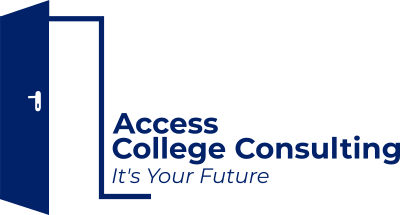College Process Resources
Welcome Greater Hartford Students
There is no shortage of information on the college process online, but where do you start?
Access College Consulting is your go to website for college guidance and resources. If you are feeling nervous about the application process or the thought of venturing off on your own – you are not alone! Access College Consulting is here to help reduce the stress of preparing for, applying and transitioning to college.
So roll up your sleeves and explore what you need to know to find the colleges that are right for you!
After you have had an opportunity to review the resources here and more details in your grade specific section, if you still have questions about your college journey, book a free session with us.
There is a lot of information here. Bookmark this page and come back often!
Check out these KHAN ACADEMY® videos featuring high school and college students who overcame all kinds of obstacles, gained confidence and the belief that they belonged in college. They did it, you can too!
KHAN ACADEMY® has created these videos, and more, to help you “learn more about what happens during college, why it matters for your future, and the wide range of students who have chosen to attend.” We couldn’t have said this better ourselves!
Check out more Khan Academy videos at https://www.khanacademy.org/college-careers-more/college-admissions/get-started
All KHAN ACADEMY® content is available for free at www.khanacademy.org
College Resources
College Entrance Tests and Test Prep
There is the SAT and the ACT. You can submit either one as a part of your college application. Check out a description of the differences from Princeton Review: https://www.princetonreview.com/college/sat-act
- The PSAT is a Preliminary SAT given to students in October of 10th and 11th grades.
Prepare for the test before you take it: https://collegereadiness.collegeboard.org/psat-nmsqt-psat-10
- The SAT
https://collegereadiness.collegeboard.org/sat
Free Test Prep from KHAN ACADEMY®
https://www.khanacademy.org/sat
- The ACT
https://www.act.org
Free Test Prep
https://www.act.org/content/act/en/products-and-services/the-act/test-preparation/free-act-test-prep.html
- Advanced Placement (AP) courses are college level classes taught in your high school by your teachers. A strong score on the exam in May could get you college credit or place you out of the introductory level class when you start college. Learn more: https://apstudents.collegeboard.org/choosing-courses
- Free Tutoring from KHAN ACADEMY®
https://www.khanacademy.org/signup
(Go to “Courses” in upper left corner)
Building Your College List
There are thousands of colleges and universities! Use these tools to help match colleges to your interests and abilities.
- Naviance
https://student.naviance.com/auth/fclookup
Log in to your school Naviance account to access their SuperMatch college search
- Big Futures
https://collegesearch.collegeboard.org/home
- Common App
https://www.commonapp.org/explore/
NOTE: When filtering using Common App – DO NOT check off anything in the Filter for Application for First Year Students. Checking any of these will eliminate strong schools that may be good fits for you.
College Applications
Over 900 colleges and universities use the Common Application platform.
More than 150 colleges and universities use the Coalition for College Application platform. These schools are dedicated to supporting low income and first generation students during the college process and in college.
Some colleges accept both applications. Students only need to choose one.
- Common Application
https://www.commonapp.org
- Coalition Application
https://www.coalitionforcollegeaccess.org
If application fees are a stretch for you, check with your school counselor to see if you qualify for application fee waivers. No college worthy of receiving your application wants affordability to be a barrier between you and applying to their school.
The personal essay and letters of recommendation allow schools to get to know you beyond your transcript and activities.
Don’t limit yourself to exploring Test Optional only schools. Many schools that typically require test scores may be test optional anyway due to requirement changes accelerated by the effects of COVID-19.
Financial Aid
Don’t let finances stop you from going to college. There are billions of dollars from the Federal Government and colleges and universities to help you pay for college.
- FAFSA – Opens this admissions cycle in December.
Overview
Filling Out the FAFSA
Federal Student Aid Application
Get your FSA ID – Get it now so you are ready to fill out the FAFSA in December. You and your parent/guardian must each create your own accounts and FSA IDs.
- CSS Profile
Overview
Getting Started
Slideshow with Audio
- Saving for College
https://www.commonapp.org/plan/paying-for-college
https://studentaid.gov/sites/default/files/saving-early.pdf
YOU MUST FILL OUT THE FAFSA AND CSS PROFILE TO RECEIVE FINANCIAL AID. Everybody has to fill them out. Your information will be confidential as long as you do not share your usernames and passwords with anyone.
Scholarships
Outside scholarships (unaffiliated with a college) are a great way to help pay for college. Remember, you do not have to pay to apply for any legitimate scholarship. If there is a fee, do not apply. Check with the colleges to which you are applying about how an outside scholarship may affect your financial aid package.
- Questbridge for high performing juniors and seniors in the top 5-10% of your high school class.
https://www.questbridge.org/high-school-students
- Fastweb
https://www.fastweb.com
- Careeronestop – U.S. Department of Labor
https://www.careeronestop.org/toolkit/training/find-scholarships.aspx
- Gabriela Carter is a Princeton senior who helps students find scholarships to help pay for college. Check out the list of scholarships she recommends. https://www.gabriellacarter.com/resource
- Have a Job in High School? Ask your employer if they have a college scholarship fund and apply. Companies want to help you succeed!
You Got into Multiple Colleges!
Choosing Your Home for the Next Four Years
Congratulations! You are going to college! When you have a few colleges from which to choose, take some time to identify the pros and cons of attending each school.
Start with ranking the schools in order that they best meet your academic, social, extracurricular, college experience/environment wants and needs. This will give you your ideal list in order of which you want to attend most.
Then compare financial aid packages.
The Financial Aid Award Letters: If you submitted your FAFSA and CSS Profile, you will receive a financial aid package from each school that admits you. It is important to understand the different types of financial aid:
- Grants and Scholarships: You do not need to pay back.
- Work Study: You get a job on campus. Your earnings go to pay for college.
- Loans: You must pay back. You do not have to accept all of the the loans offered.
Note that even with the financial aid package, there will be a balance that you will have to pay. Your total payment requirement will equal the balance + any loans you will take out + interest on those loans.
Weighing Your Options: It is important to compare financial aid packages between schools. Stronger packages include more grants and scholarships and fewer loans.
Appealing Your Financial Aid: Financial situations can change, especially today with the effects of COVID-19 on many people’s jobs. If your financial circumstances have changed since you applied to college, you may be able to appeal your award. Reach out to the college financial aid office.
For more information about how to read your award letters, book a free session with us!
Accept and Place Your Deposit by May 1 to one school. Decline the other colleges that accepted you.
You Did It! You Are Going to College!
First Generation College Students
I’m First! was created in 2013 to provide students who lack a family history of higher education with inspiration, information, and support on the road to and through college.
- I’m First
https://imfirst.org
- I’m First Guide to College
http://imfirst.org/wp-content/uploads/2020/12/2021-Im-First-Guide-to-College-Preview.pdf
College Lingo You Need to Know
Major
A major is a field of study you choose in college where you are required to take a certain number of courses in that field to earn your Bachelor’s Degree. Most colleges do not require that you declare your major until second semester sophomore year, unless you attend an engineering or other specialty school.
Minor
Similar to a major but fewer courses required, a minor is a field of study you choose in college (in addition to your major) where you are required to take a certain number of courses in that field. You can minor in something that complements your major or in something completely different that interests you.
Professor Office Hours
Professors do more than just teach your classes. At the beginning of each semester, your professors will share their office hours – a few hours each week when they are available for you to come by their office to ask questions about class, ask for advice, work with them on research projects, and to be mentors to you. They are there for YOU. Do not wait to ask questions if you have them!
Prerequisite Course
Many college courses will require that you take an introductory or other courses (prerequisite) before permitting you to register for a higher level course.
Syllabus
Each of your professors will share with you a ‘syllabus’ which outlines their expectations for their class, including homework & reading assignments, quizzes, tests, midterms and final exam. It will indicate the weight of assignments and tests, for example, you may have only two mid-term exams, each worth 25% of your grade and a final, worth 50% of your grade. You are responsible to get the required work done in between to make sure you are prepared for the exams.
Academic Advisor
A university professor or staff member that is assigned to you to help guide you in your academic endeavors. You will discuss what classes to take, what you may want to major in and academic requirements. Make sure you take advantage of having them as a resource.
RA
Your RA is your Resident Advisor, usually an upperclassman that lives in your dorm and is available to you if you have any questions about anything: dorm life, roommate issues, your classes, the best places to eat on campus. They have been in your shoes, use them as a resource and friend!
Meal Plans
A meal plan is food dollars typically placed on your student ID. College meal plans vary but you should have access to many different food options on and sometimes off campus. Which meal plan you choose depends on your appetite and potentially your financial aid package. If you run out of food dollars before the semester is over, you can add more food dollars. If you are on financial aid or a school scholarship, talk to your financial aid officer.
Greek Life
A system of fraternities (boys) and sororities (girls) that add a social and community component to the college experience. You do not have to be in one to have the full college experience. Most college campuses have less than ½ of students participate. Some schools have living communities that are based on academic or other areas of interest.
This is a lot to take in. Bookmark this page and come back often. And be sure to check out the individual grade pages for additional information. If you have any questions, set up a free 30 minute session with us.









